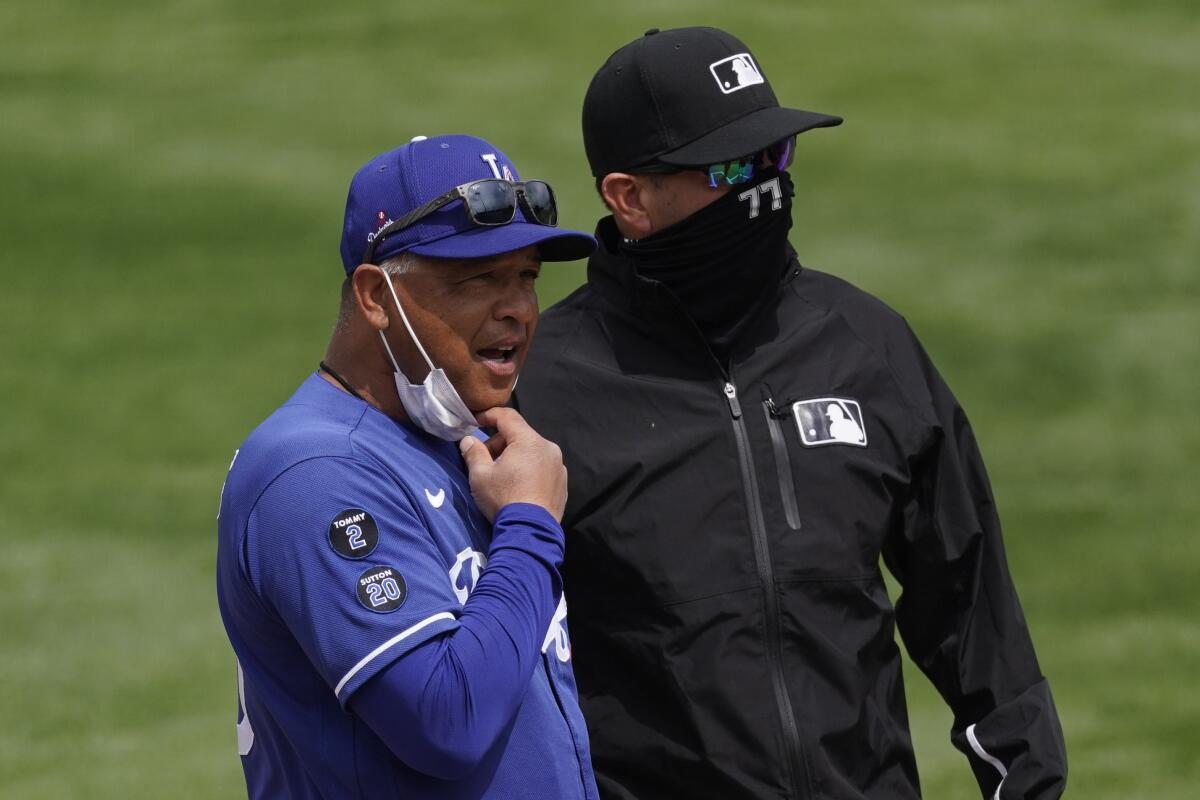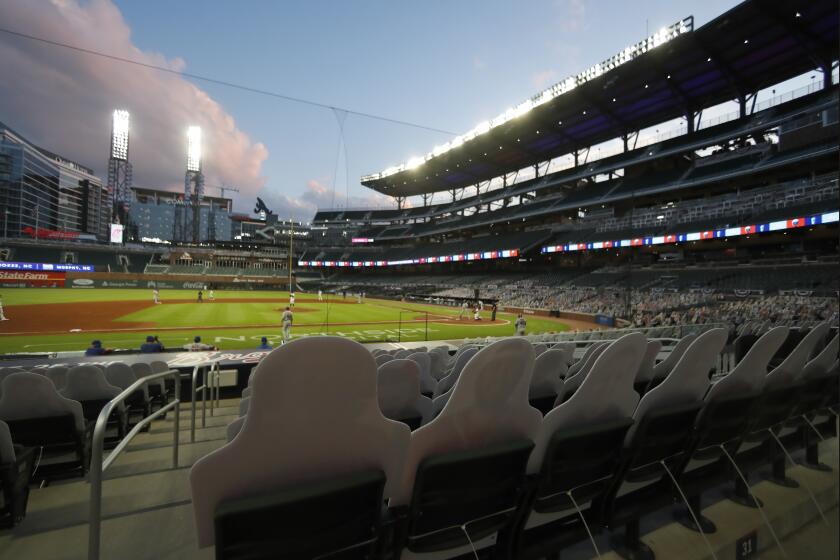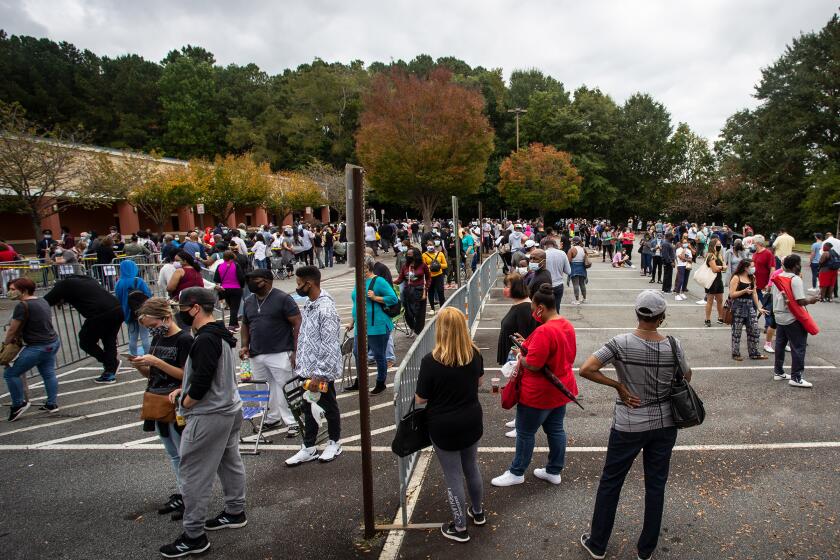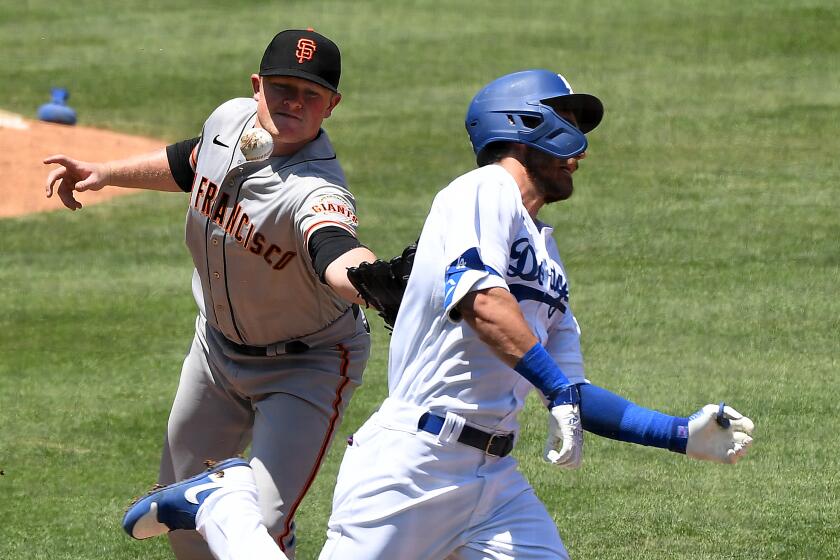Dodgers’ Dave Roberts says he’d consider not managing 2021 All-Star game in Atlanta

- Share via
If Major League Baseball opts not to move this year’s All-Star game out of Atlanta, Dodgers manager Dave Roberts said Friday he would consider declining the honor of managing the National League team.
“If it gets to that point,” Roberts said, “it’ll certainly be a decision I’ll have to make personally.”
Roberts spoke on the day after Georgia adopted a new law that makes it harder to vote, with the Black community expected to be disproportionately affected. President Biden criticized the law as “Jim Crow in the 21st century,” and Major League Baseball Players Assn. executive director Tony Clark said the union “would look forward” to discussing with the league whether to relocate the All-Star game.
Roberts, who is Black and Asian American, is one of two Black managers in MLB, along with Dusty Baker of the Houston Astros. Roberts also is one of two Black managers to win a World Series, along with Cito Gaston of the Toronto Blue Jays.
If Georgia persists in pursuing laws that will make it harder to vote, and disproportionately so for Black communities, MLB should move the 2021 All-Star game out of Atlanta.
His platform provides him with the opportunity to speak out and be heard on high-profile social issues, such as the recent wave of hate crimes against Asian Americans. Roberts said he would have to learn more about the Georgia situation but said he was concerned by what he has heard.
“When you’re trying to restrict African American votes — American citizens — that’s alarming to me to hear,” Roberts said.
The Georgia law limits where voters can drop off ballots, requires additional layers of identification for absentee voters, narrows who can use a provisional ballot, and authorizes the state legislature to override local election officials. The law also makes it a crime to provide food or water to voters waiting in line to cast a ballot.
Corporations, especially Georgia-based businesses like Delta and Coca-Cola, respond by ramping up criticism of new voting restrictions in the state.
Clark told the Boston Globe that “players are very much aware” of the new Georgia voting restrictions. Clark said the union would welcome the chance to engage with the commissioner’s office about the possibility of moving the game.
“As it relates to the All-Star game,” Clark said, “we have not had a conversation with the league on that issue. If there is an opportunity to, we would look forward to having that conversation.”
The Padres might be a rising power in the NL West, but the Dodgers’ enduring rivalry with the Giants spans two states, several Hall of Famers and many decades.
The NBA moved its 2017 All-Star game out of Charlotte after North Carolina adopted a “bathroom bill” that limited anti-discrimination protections. The NFL moved the 1993 Super Bowl out of Arizona after voters there rejected a proposal to make Martin Luther King Jr. Day a state holiday.
Billions at stake
In 2012, the Dodgers were sold to Guggenheim Baseball Management for $2.15 billion, a price that included the team, Dodger Stadium, and half-ownership of the stadium parking lot.
In 2021, the Dodgers are worth $4.62 billion, Sportico estimated in its Major League Baseball franchise valuations released Friday.
The Dodgers’ estimate valued the team itself at $3.75 billion. The remaining value came from ownership stakes in affiliated companies that control the stadium property and SportsNet LA, plus a venture capital affiliate called Elysian Park Ventures.
The Dodgers themselves do not own the stakes in the parking lot or SportsNet LA, or the venture capital fund. That is an example of why a salary cap would be difficult to implement in MLB.
Although players would get a defined percentage of revenue under a salary cap, the league would want to limit the players to a percentage of team-generated revenue, while the union would want revenue from all the related ownership ventures to be included in the calculation.
More to Read
Are you a true-blue fan?
Get our Dodgers Dugout newsletter for insights, news and much more.
You may occasionally receive promotional content from the Los Angeles Times.













